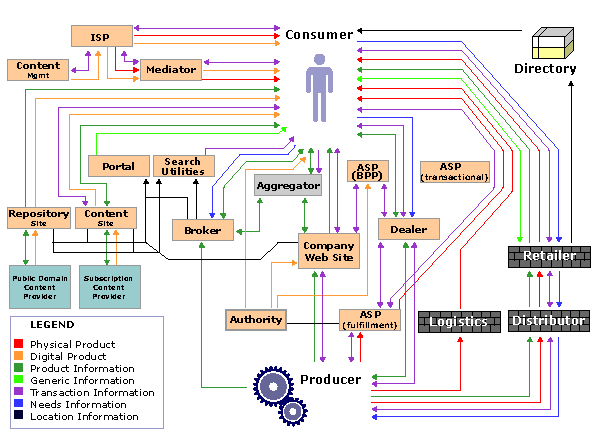Enact Market Flow Stage
In the enact stage, we see the characterizing of the integration of processes across entities and the emergence of the aggregator.
Aggregator:
The aggregator brings together digital products, physical products, and services from multiple brokers, companies, and dealers, to deliver solutions to complex consumer needs.
Historial Cost Prevention Barrier
Historically, the massive integration and coordination of business processes required to perform as an aggregator created a cost-preventive barrier.
With the emergence of Web technologies related to information management and transactional execution, the role of the aggregator became possible. We also now see more extensive acceptance of the ASP model. ASP fulfillment organizations have appeared which outsource all aspects of transactional and physical goods delivery, making e-Commerce a reality for many small- to medium-sized businesses who could not individually afford the requisite infrastructure but whose margins support the pay-as-you-go cash flow of the ASP environment.
An application service provider (ASP) is a company that offers individuals or enterprises access over the Internet to applications and services that would otherwise have to be located on their own local hardware. ASP services are expected to become an important alternative, not only for smaller companies with low budgets for information technology, but also for larger companies as a form of outsourcing and for many services for individuals as well. We also see transactional ASPs, such as the Bank of Scotland, who offer demand deposit and other checking services on an ASP basis to businesses who would like to offer banking services as part of their product suite.
With the emergence of Web technologies related to information management and transactional execution, the role of the aggregator became possible. We also now see more extensive acceptance of the ASP model. ASP fulfillment organizations have appeared which outsource all aspects of transactional and physical goods delivery, making e-Commerce a reality for many small- to medium-sized businesses who could not individually afford the requisite infrastructure but whose margins support the pay-as-you-go cash flow of the ASP environment.
An application service provider (ASP) is a company that offers individuals or enterprises access over the Internet to applications and services that would otherwise have to be located on their own local hardware. ASP services are expected to become an important alternative, not only for smaller companies with low budgets for information technology, but also for larger companies as a form of outsourcing and for many services for individuals as well. We also see transactional ASPs, such as the Bank of Scotland, who offer demand deposit and other checking services on an ASP basis to businesses who would like to offer banking services as part of their product suite.
Competitive Landscape
Online Purchase Behavior
The digital age and rise of online shopping have driven an unprecedented business model shift for consumer product manufacturers and retailers. Many traditional consumer businesses and new start-ups alike are moving away from models that are
shop- centric or geographically-focused, to ones that are customer-centric and virtually borderless. To help inform companies tackling this transformation, DistributedNetworks recent survey of 18,397 consumers provides a unique, comprehensive index of consumer online shopping behaviors and sentiments across countries, products and generations.